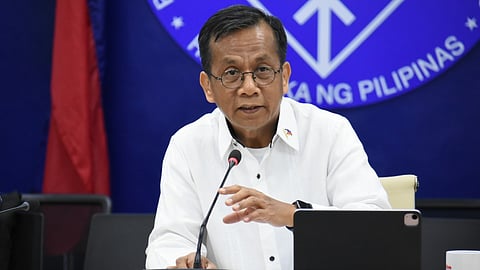
- NEWS
- the EDIT
- COMMENTARY
- BUSINESS
- LIFE
- SHOW
- ACTION
- GLOBAL GOALS
- SNAPS
- DYARYO TIRADA
- MORE

The National Economic and Development Authority (NEDA) expressed conditional support for proposed amendments to the Rice Tariffication Law (RTL) for as long as the National Food Authority (NFA) will only intervene in the market during emergencies.
In a Palace briefing on Monday, NEDA Secretary Arsenio Balisacan said that revising the RTL will grant the NFA the ability to manage a reserve stock specifically for emergencies.
He said this would allow the NFA to intervene in situations like sharp price increases or natural disasters that disrupt supply and impact vulnerable populations.
"The amendment should clearly define what constitutes an emergency," Balisacan said.
He envisioned the emergency stockpile being used to assist low-income Filipinos and areas severely affected by droughts, floods, or other calamities.
The restoration of the NFA's authority to buy and distribute rice, a financially detrimental practice that entails purchasing rice from farmers at higher rates and selling it to consumers at cheaper prices, is one of the revisions under consideration under the RTL.
“The gains in the reforms that we have had over the years must be preserved, and a part of these reform programs that we have done is to improve the efficiency and operation of NFA,” Balisacan said.
President Ferdinand Marcos Jr. earlier said that he intended to certify the RTL amendments as urgent to reduce the prices of rice, which are currently ranging from P50 to P60 per kilo.
When asked for an update on Marcos' proposal for the National Food Authority (NFA) to enter the rice market and compete with retailers and traders, Balisacan reiterated the need for clarity regarding the definition of emergencies under the law governing NFA operations.
"It's not clear in the law what that emergency is when we say we stock for buffer stocking," Balisacan said.
Balisacan also emphasized that while calamities like floods and droughts typically trigger supply chain disruptions leading to price hikes, manipulative actions by market players could also necessitate intervention.
Acknowledging the role of the Philippine Competition Commission (PCC) in combating cartels and hoarders, Balisacan noted the inherent delay in the commission's processes. "The Competition Commission’s processes take quite long because there is an investigation, and by the time the investigation is done, the action is over," he explained.
